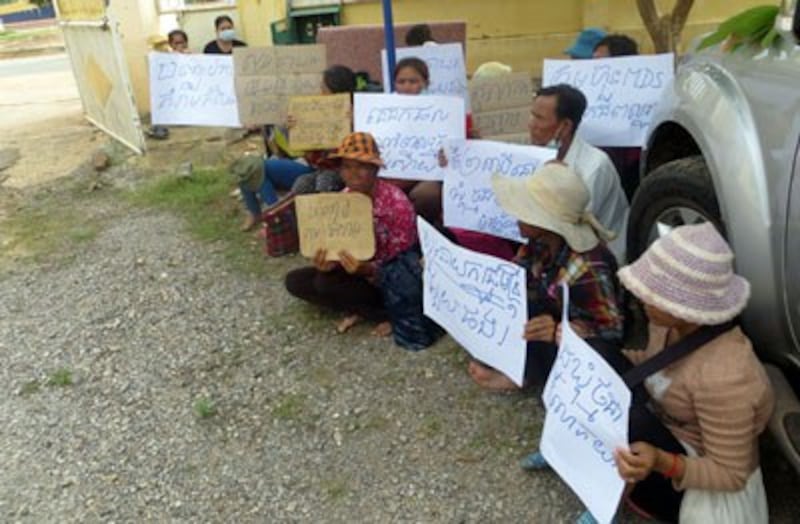Around 100 ethnic Phnong villagers held a protest Tuesday in support of five fellow residents questioned at a court in northeastern Cambodia’s Kratie province over “illegal logging” amid a land dispute with a Vietnamese rubber company they say has encroached on their community forest.
The villagers from 179 families living in Thmey commune, in Kratie’s Borei district said the provincial court summoned the five as a “threat” to anyone brazen enough to challenge Vietnam’s Doty Saigon-Binh Phouc, which they claim is destroying the forest they rely on for resources and religious purposes.
Protester Set Seb told RFA’s Khmer Service that her family had been unable to harvest fruits, vines and resin since Doty Saigon began clearing land early last year and said villagers could no longer earn a reasonable income from the forest.
She called on the government to uphold villagers’ rights to the land, so that they could continue to use the forest without cutting down its trees—in a sustainable manner according to their traditional customs.
“They have been protesting to take back the land for collective property, not for private use,” she said of the five villagers summoned by the court, adding that residents had also been unable to cultivate any rice due to drought, and were solely relying on the forest to meet their needs.
After being questioned, the five were released by the court.
Suos Vannak, an official with local rights group Adhoc, said his organization had provided legal defense to the five and dismissed allegations of illegal logging against them, saying there was no evidence to support the claims.
Hum Ngor, one of the villagers questioned Tuesday, said the concession had affected his ethnic community’s indigenous culture and customs.
“We villagers dare to sacrifice lives to protect our forest because the forest is our lives,” he said.
In March 2007, the Council of Ministers approved in principle a 6,436-hectare (15,900-acre) concession to Doty Saigon, adjacent to the more than 500 hectares (1,235 acres) of forest land claimed by the Phnong villagers.
Last year, authorities proposed marking off a tract measuring around 170 hectares (425 acres) for the villagers, which they have rejected.
Since Doty Saigon began clearing land last year, local residents have become increasingly vocal about the forest and have even seized company tractors, though local authorities have refused to act on their behalf because a higher level of government had issued the rubber firm’s land concession.
Khmer Kampuchea Krom For Human Rights and Development Association program director Sann Chhumsokthun said Doty Saigon had likely filed a complaint with the court against the five villagers, who he said were “activists protecting the forest” from encroachment.
He urged the government to do more to avoid causing disputes between developers and local communities.
“Before the government grants licenses to companies, it should conduct environmental studies to prevent future protests,” he said.
Pursat casino

Also on Tuesday, villagers and rights groups accused a company owned by timber magnate Try Pheap of encroaching on their land in Pursat province’s Veal Veng district.
Villager Chea Sayon told RFA he was shocked when he recently found members of the armed forces and employees of Try Pheap’s company MDS Group planting mango trees on part of the 17 hectares (42 acres) he has owned and farmed since 2000.
“They [the company] threatened that if I remove their trees they would have me arrested and bring me to court,” he said.
In addition to planting trees, the company has also been clearing parts of his and other villagers’ land since 2010, after it was granted more than 20,000 hectares (49,400 acres) to build a casino.
MDS provincial director Kheang Sochivoan told RFA his company was implementing the government’s orders and had provided about 400 hectares (990 acres) of land to local villagers.
He said villagers who claim they own property in the area lack titles to support their claims and that the company would be unable to honor their demands to relinquish the land.
Provincial spokesman Koeut Chhe said local authorities are working to resolve the dispute with 21 families living in the area, and were in the process of granting five of them with land titles.
He said authorities had received six complaints from six additional families, but won’t be able to address them until the disputes with the initial 21 families are resolved.
“We have already received the complaints and are addressing them step by step,” he said.
Rights groups accuse Try Pheap of running a vast illegal logging operation across the country with the government’s tacit consent.
In February, the London-based environmental watchdog Global Witness said in a report that China’s voracious demand for luxury furniture is driving a multimillion-dollar illegal trade in rosewood in Cambodia, supported by the tycoon, who controls a network that exports the timber.
Reported by Chin Chetha and Men Sothy for RFA’s Khmer Service. Translated by Samean Yun. Written in English by Joshua Lipes.
